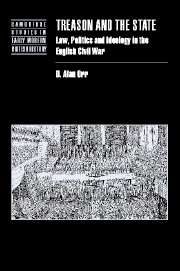Book contents
- Frontmatter
- Contents
- Acknowledgments
- List of abbreviations
- Introduction
- Part I Concepts
- Part II Practice
- 3 Thomas Wentworth, First Earl of Strafford
- 4 William Laud, Archbishop of Canterbury
- 5 Connor Lord Maguire, Second Baron of Enniskillen
- 6 Charles Stuart, King of England
- Conclusion
- Bibliography
- Index
- Cambridge Studies in Early Modern British History
5 - Connor Lord Maguire, Second Baron of Enniskillen
Published online by Cambridge University Press: 21 July 2009
- Frontmatter
- Contents
- Acknowledgments
- List of abbreviations
- Introduction
- Part I Concepts
- Part II Practice
- 3 Thomas Wentworth, First Earl of Strafford
- 4 William Laud, Archbishop of Canterbury
- 5 Connor Lord Maguire, Second Baron of Enniskillen
- 6 Charles Stuart, King of England
- Conclusion
- Bibliography
- Index
- Cambridge Studies in Early Modern British History
Summary
The treason trial of Connor Lord Maguire, Second Baron of Enniskillen, in February 1645 brought into focus competing conceptions of the constitutional relationship of England and Ireland. Maguire stood implicated in the plot to seize Dublin Castle on 23 October 1641 during the Irish Revolt of that year and was tried in early 1645 before a Middlesex jury. The key issue of the trial was whether Maguire, as a peer of Ireland, having committed treasonable acts in Ireland and elsewhere, and being brought “into England against his will, might be lawfully tryed … in the King's Bench at Westminster by a Middlesex Jury, and outed of his tryal by Irish Peers of his condition by the statute of 35 Henry VIII c. 2.” In the Earl of Strafford's trial almost four years earlier the defense had consistently assumed a position of Irish constitutional “exceptionalism.” Both Strafford and other apologists for his rule as Lord Deputy in Ireland during the 1630s adopted this constitutional stance in response to proceedings against them in both the English and Irish parliaments during 1641. This position held that, while Magna Carta and the common law generally held sway in Ireland, because of circumstances unique to that kingdom, significant exceptions existed with regard to the legal rights and privileges that these legal instruments conferred on the king's Irish subjects.
- Type
- Chapter
- Information
- Treason and the StateLaw, Politics and Ideology in the English Civil War, pp. 141 - 170Publisher: Cambridge University PressPrint publication year: 2002

